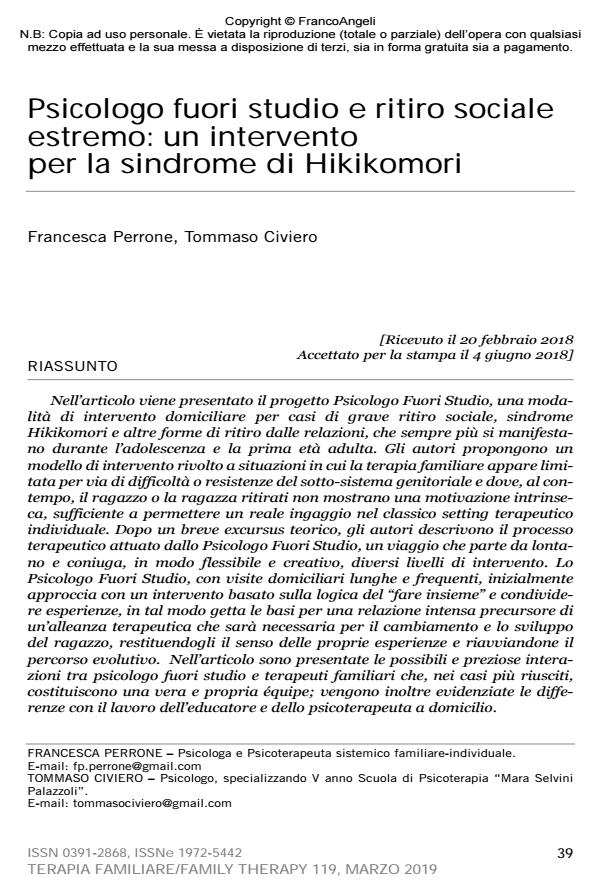Psychologist Outside Of The Studio and extreme social withdrawal: an intervention for Hikikomori syndrome
Journal title TERAPIA FAMILIARE
Author/s Francesca Perrone, Tommaso Civiero
Publishing Year 2019 Issue 2019/119
Language Italian Pages 23 P. 39-61 File size 118 KB
DOI 10.3280/TF2019-119004
DOI is like a bar code for intellectual property: to have more infomation
click here
Below, you can see the article first page
If you want to buy this article in PDF format, you can do it, following the instructions to buy download credits

FrancoAngeli is member of Publishers International Linking Association, Inc (PILA), a not-for-profit association which run the CrossRef service enabling links to and from online scholarly content.
In this study, the so called "Psychologist Outside Of The Studio" project is explained. This is a home based intervention method for cases of severe social withdrawal, Hikikomori syndrome and other forms of withdrawal from relationships that manifest during adolescence and early adulthood. The authors propose an intervention model dedicated to those situations in which family therapy appears to have limited success due to difficulties or resistance by the parental subsystem and, simultaneously, when the withdrawn young person does not demonstrate an intrinsic motivation sufficient to allow true engagement in the classical setting of individual therapy. After a brief theoretical survey, the authors describe how "Psychologist Outside Of The Studio" functions using a theoretical process has been developed after thorough revisions. "Psychologist Outside Of The Studio" succeeds in connecting multiple intervention levels in a flexible and innovative manner. "Psychologist Outside Of The Studio" operates through long and frequent home-visits and the initial phase of the intervention is based on the logic of "doing it together" and sharing experiences. Through this specific method, the basis is created for an intense relationship which is the precursor of a therapeutic alliance. This has been proven necessary for the change and development of the young person, as this allows them to rediscover the meaning of their own experiences and to continue to mature in a developmentally appropriate manner. The article explains the wide range of possible and valuable interactions between "Psychologist Outside Of The Studio" and family therapists. A genuine collaboration between these professions has led to the best observed outcomes. In addition, the differences between the work of an educator and a home psychotherapist are highlighted.
Keywords: Social withdrawal, Hikikomori, home based intervention, adolescence, early adulthood, "Psychologist Out Of Studio".
- The systemic‐family‐individual approach: The heritage and continuation of Mara Selvini Palazzoli's work in integrative psychotherapy Luca Codecá, Jody Russon, Matteo Selvini, in Journal of Marital and Family Therapy /2024 pp.706
DOI: 10.1111/jmft.12707
Francesca Perrone, Tommaso Civiero, Psicologo fuori studio e ritiro sociale estremo: un intervento per la sindrome di Hikikomori in "TERAPIA FAMILIARE" 119/2019, pp 39-61, DOI: 10.3280/TF2019-119004